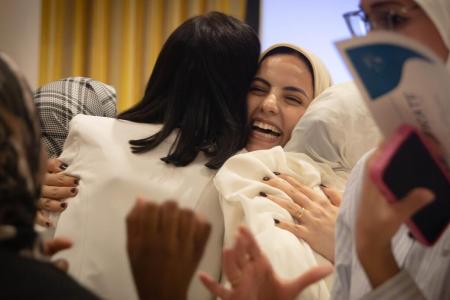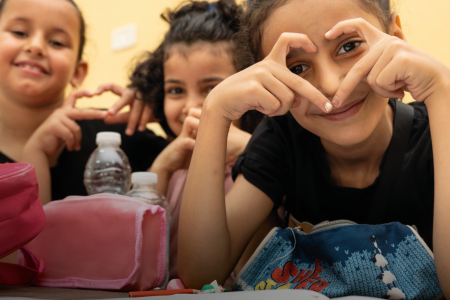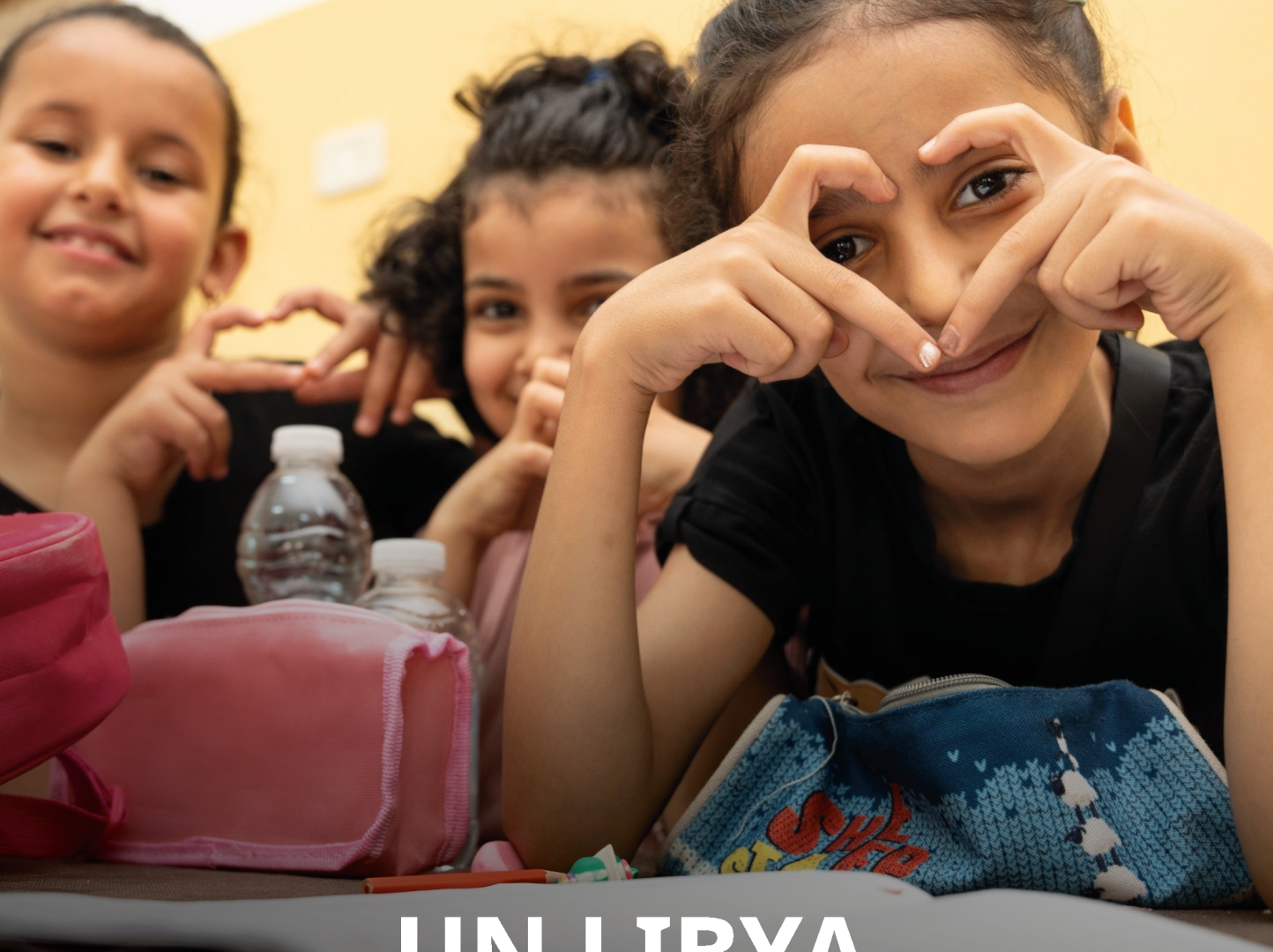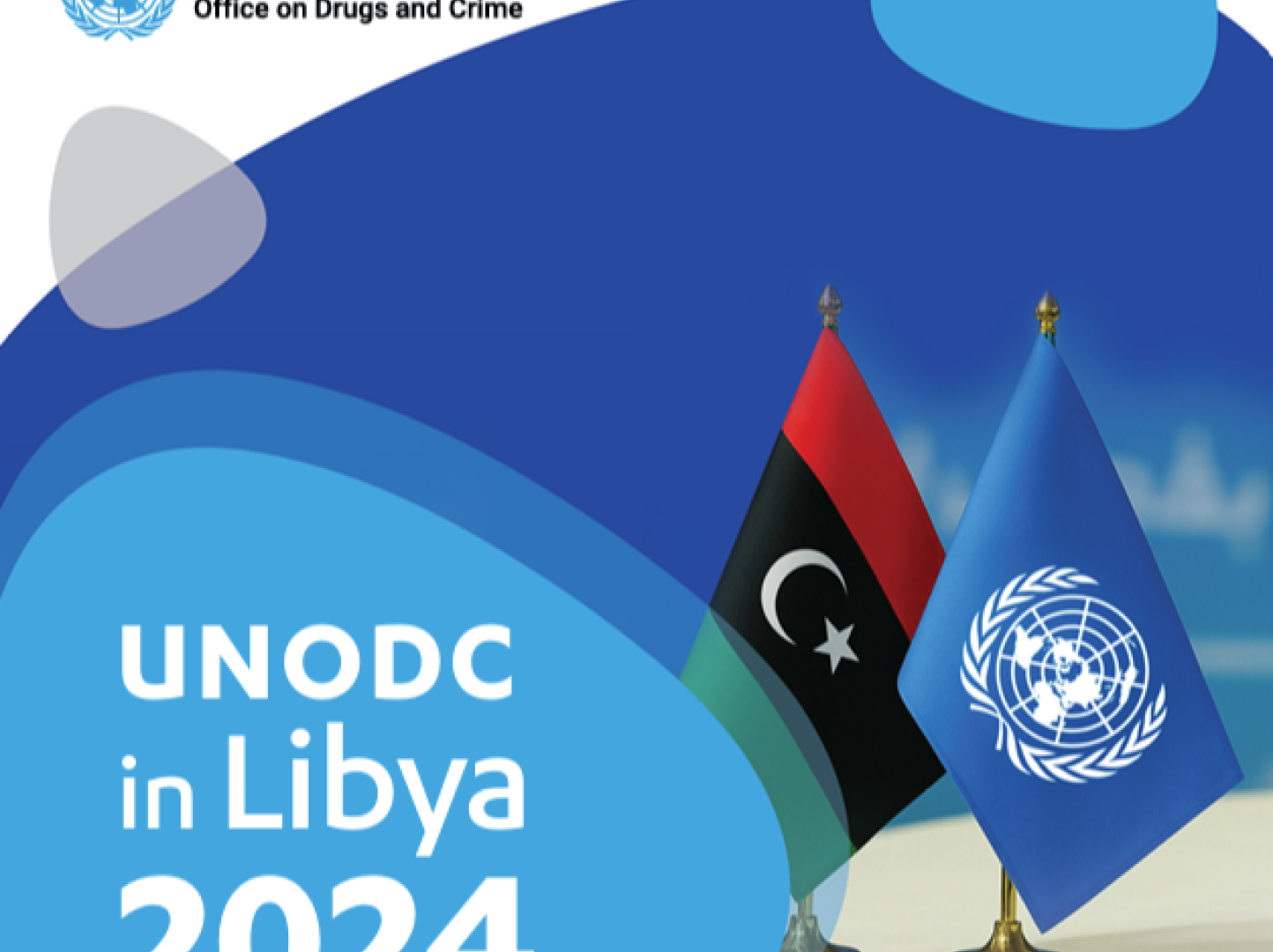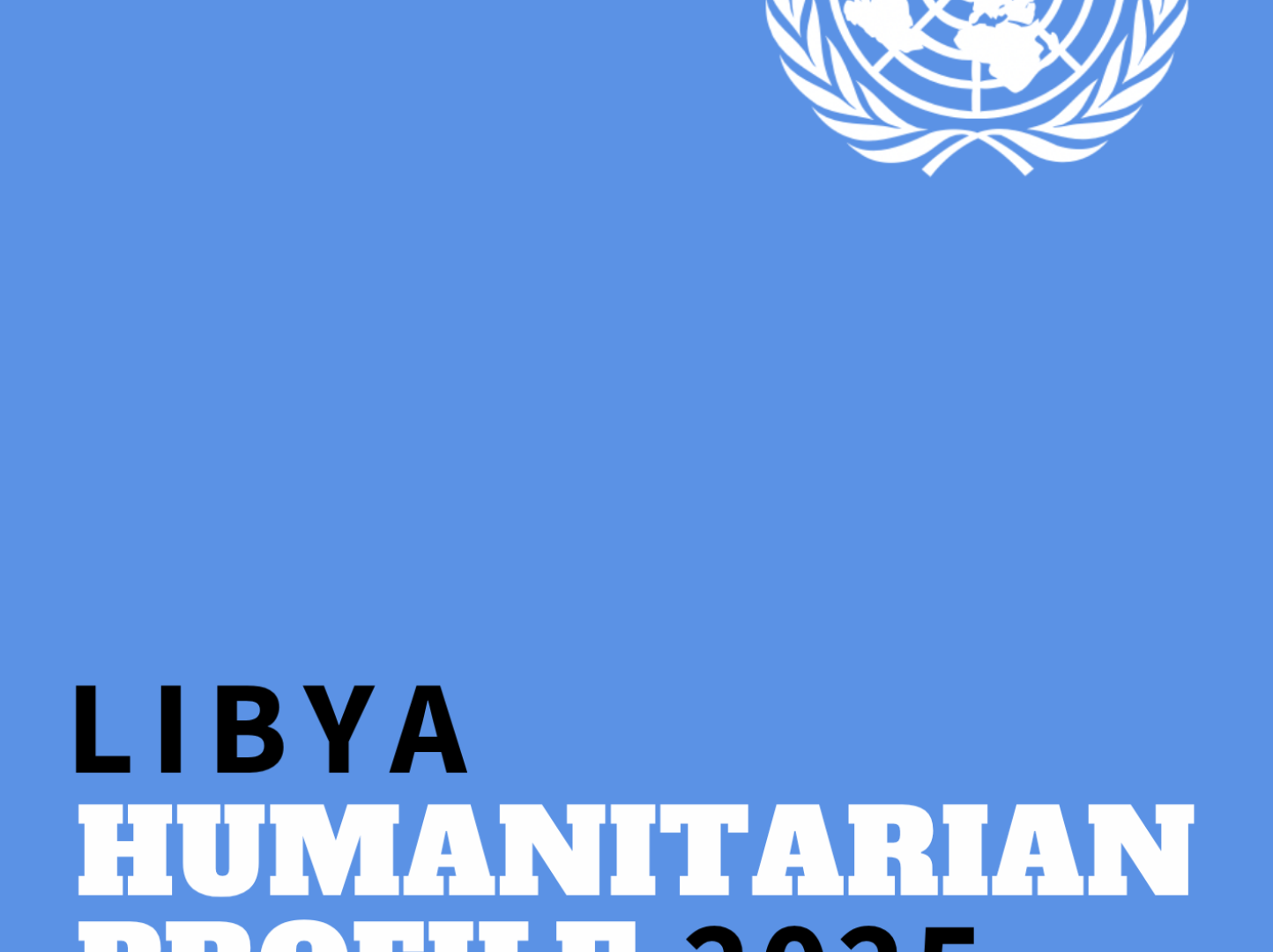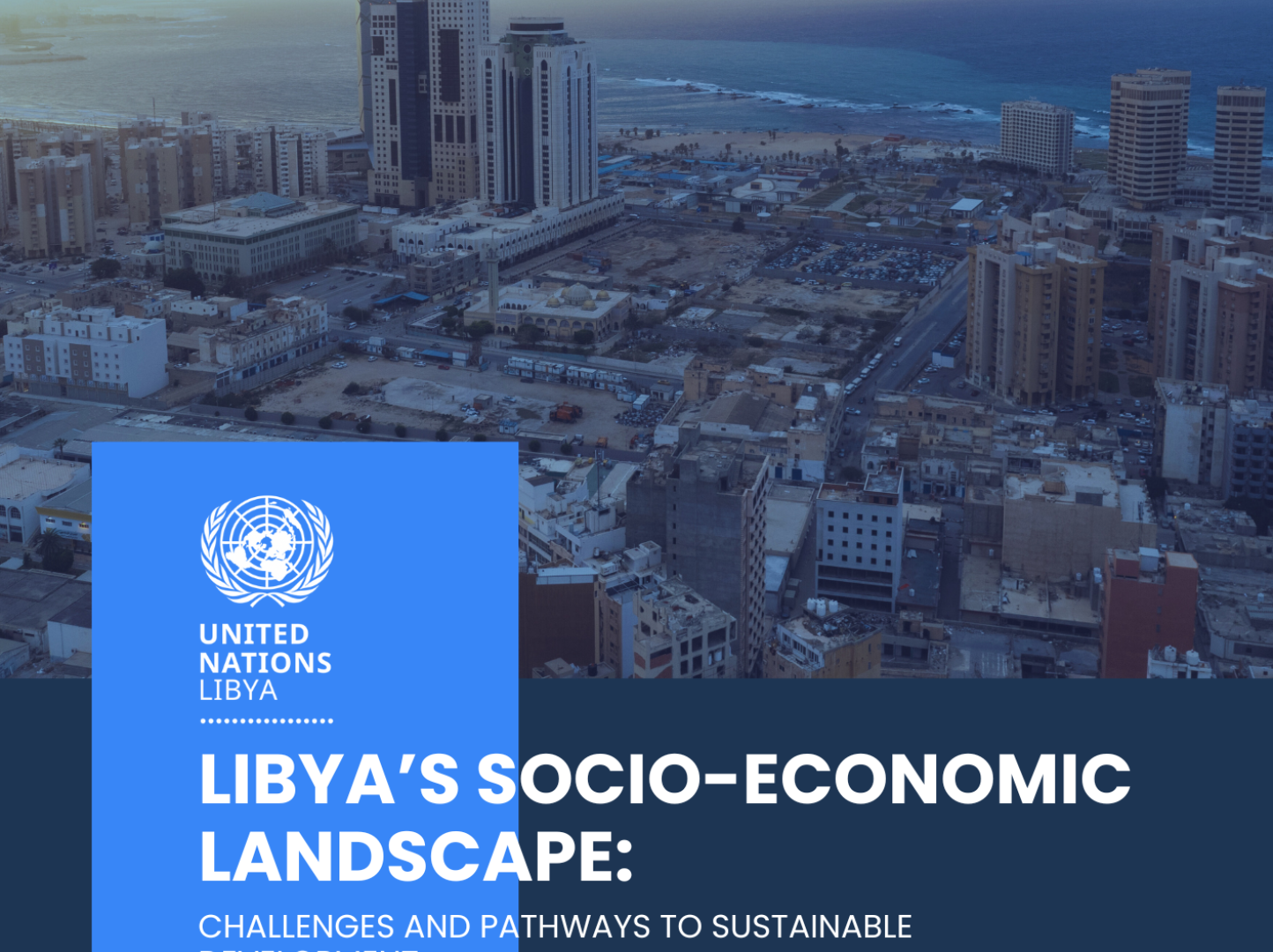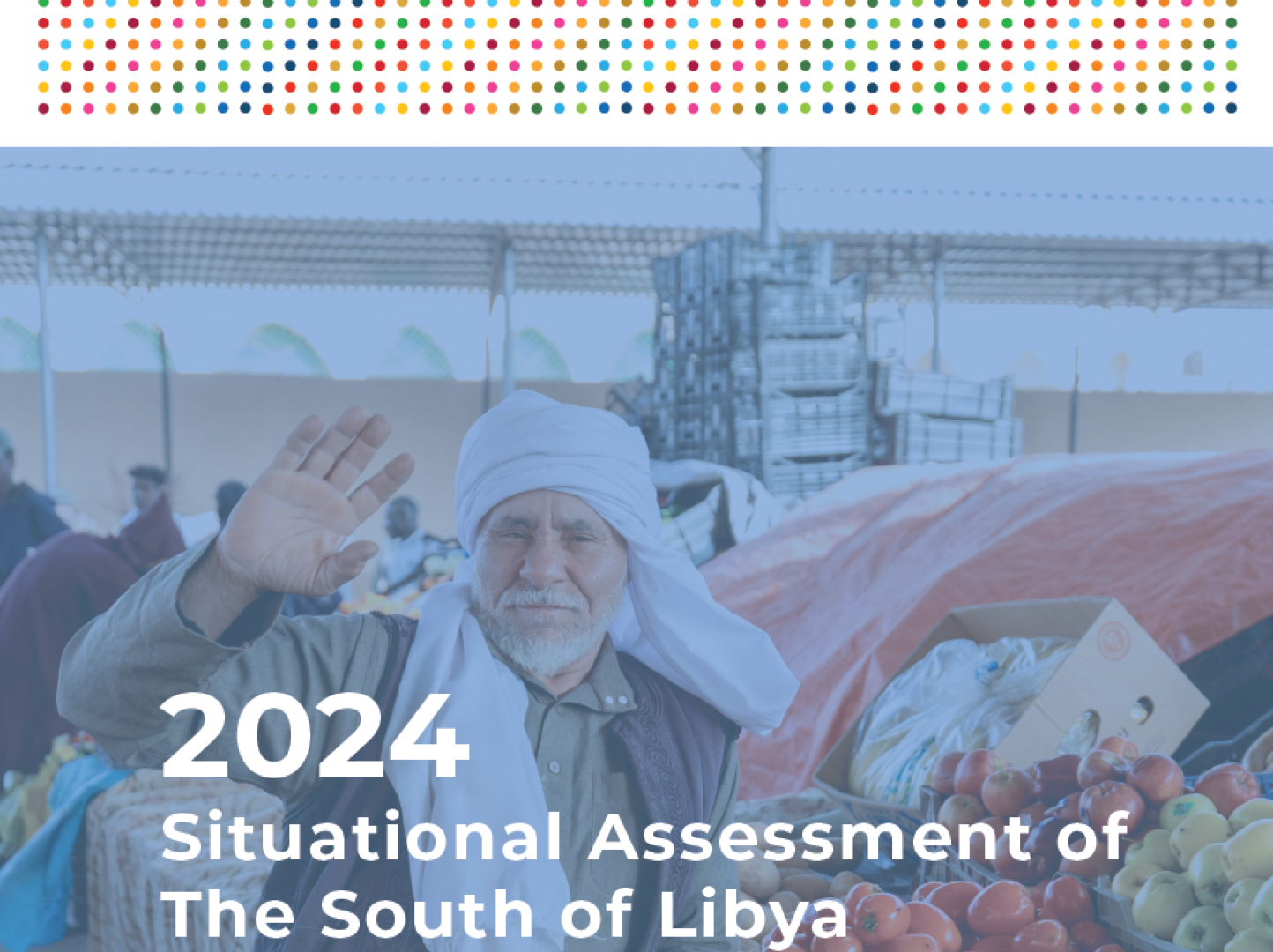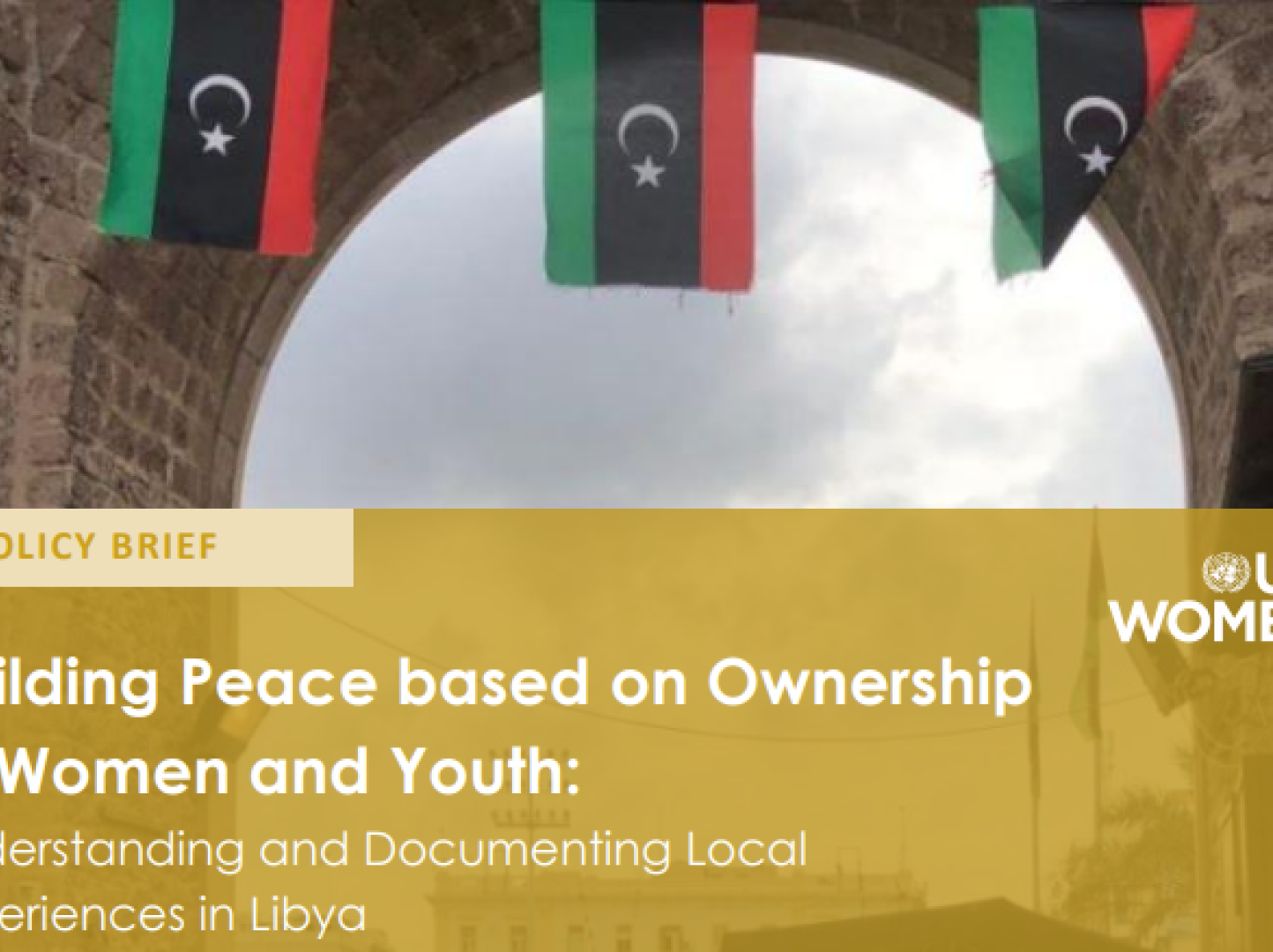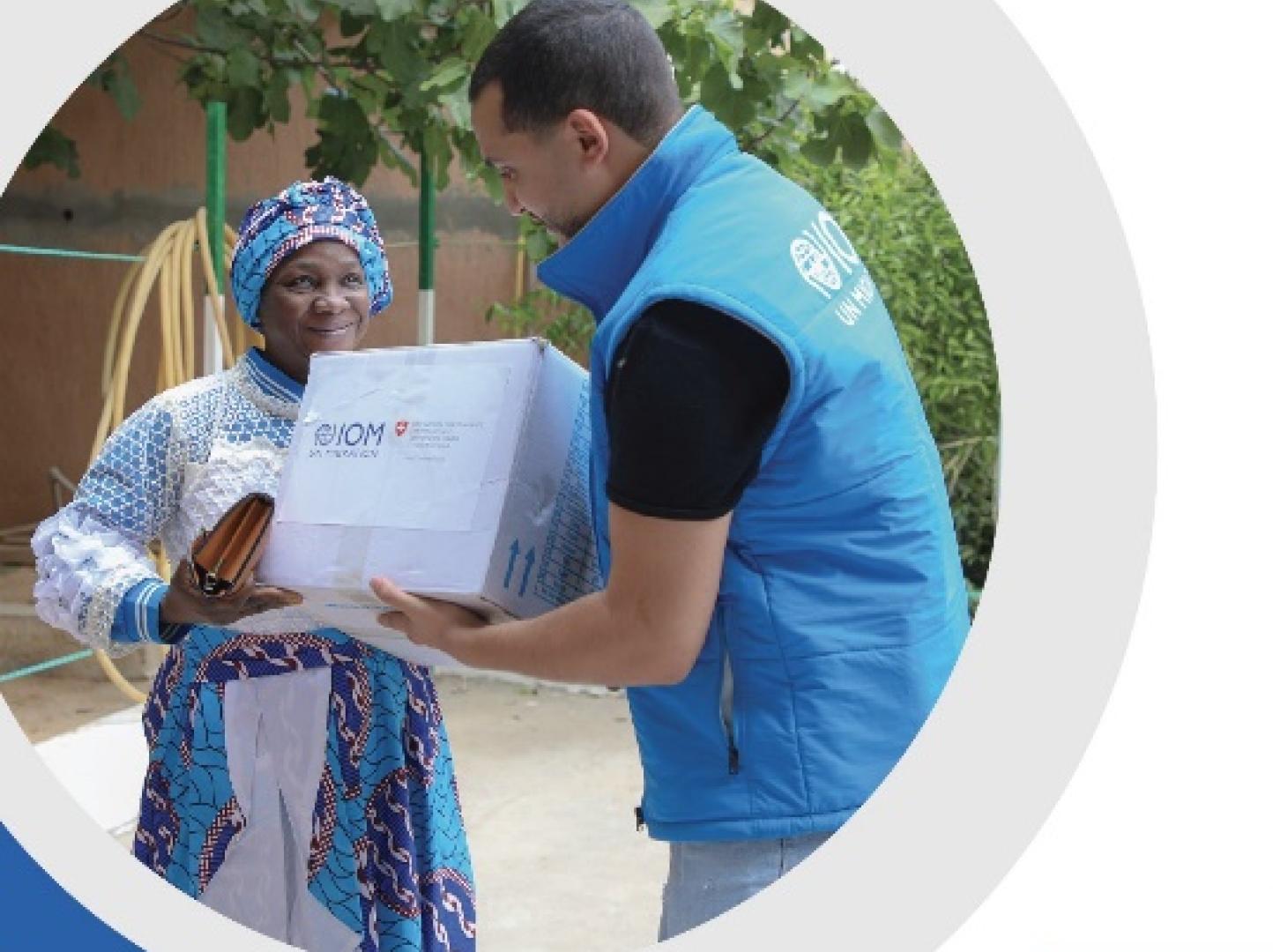Latest
Story
24 December 2025
When the Possibility of Return Becomes Real
Learn more
Story
16 December 2025
75 years of providing Protection
Learn more
Press Release
10 December 2025
Libya Marks International Anti-Corruption Day with the Launch of Phase II of the EU-Funded Project to Counter Corruption and Money Laundering, Implemented by UNODC
Learn more
Latest
The Sustainable Development Goals in Libya
The Sustainable Development Goals are a global call to action to end poverty, protect the earth’s environment and climate, and ensure that people everywhere can enjoy peace and prosperity. These are the goals the UN is working on in Libya:
Press Release
10 August 2025
Secretary-General appoints Ms. Ingeborg Ulrika Ulfsdotter Richardson of Sweden as Deputy Special Representative of the Secretary-General in the United Nations Support Mission in Libya and Resident Coordinator in Libya
She has over 30 years of experience in development and humanitarian assistance and post-conflict recovery, with a focus on complex political, socio-economic, and human rights contexts. She has spent most of her career with the United Nations, serving in various regions, including West and Central Africa, the Caribbean, the Western Balkans and South-East Europe. Ms. Richardson has been the Deputy Special Representative for the United Nations Integrated Office in Haiti (BINUH), Resident and Humanitarian Coordinator in Haiti since 2022, and was previously the Resident Coordinator in Kosovo, working closely with United Nations Interim Administration Mission in Kosovo (UNMIK) (2018-2022). Her earlier assignments include serving as the United Nations Resident Coordinator and Resident Representative of the United Nations Development Programme (UNDP), United Nations Children’s Fund and United Nations Population Fund in Cabo Verde (2013-2018), UNDP Resident Representative in Gabon (2012-2013), and Deputy Resident Representative in Türkiye (2007-2012) and in Cuba (2004-2007).Ms. Richardson holds a master’s degree in development economics from Gothenburg University and a Bachelor of Social Science from Lund University, both in Sweden. In addition to her native Swedish, she is fluent in English, French, Portuguese, and Spanish.New York, 8 August 2025
1 of 5
Publication
25 June 2025
UN Libya Annual Results Report 2024
In 2024, the UN in Libya continued to support Libya’s development priorities through more than 250 projects and initiatives under the United Nations Sustainable Development Cooperation Framework (2023–2026), focusing on:Peace and GovernanceSustainable Economic DevelopmentSocial and Human Capital DevelopmentClimate Change, Environment, and WaterDurable Solutions for Internally Displaced Persons (IDPs)Migration ManagementFrom supporting municipal elections to helping launch Libya’s first National Sustainable Energy Strategy—and from enhancing access to services for IDPs and host communities to expanding opportunities for youth and women—2024 marked meaningful progress across the country.In 2025, the UN in Libya will continue to work with national and local partners to advance inclusive and sustainable development, strengthen service delivery, and respond to emerging needs—with a focus on climate resilience and youth empowerment.
1 of 5
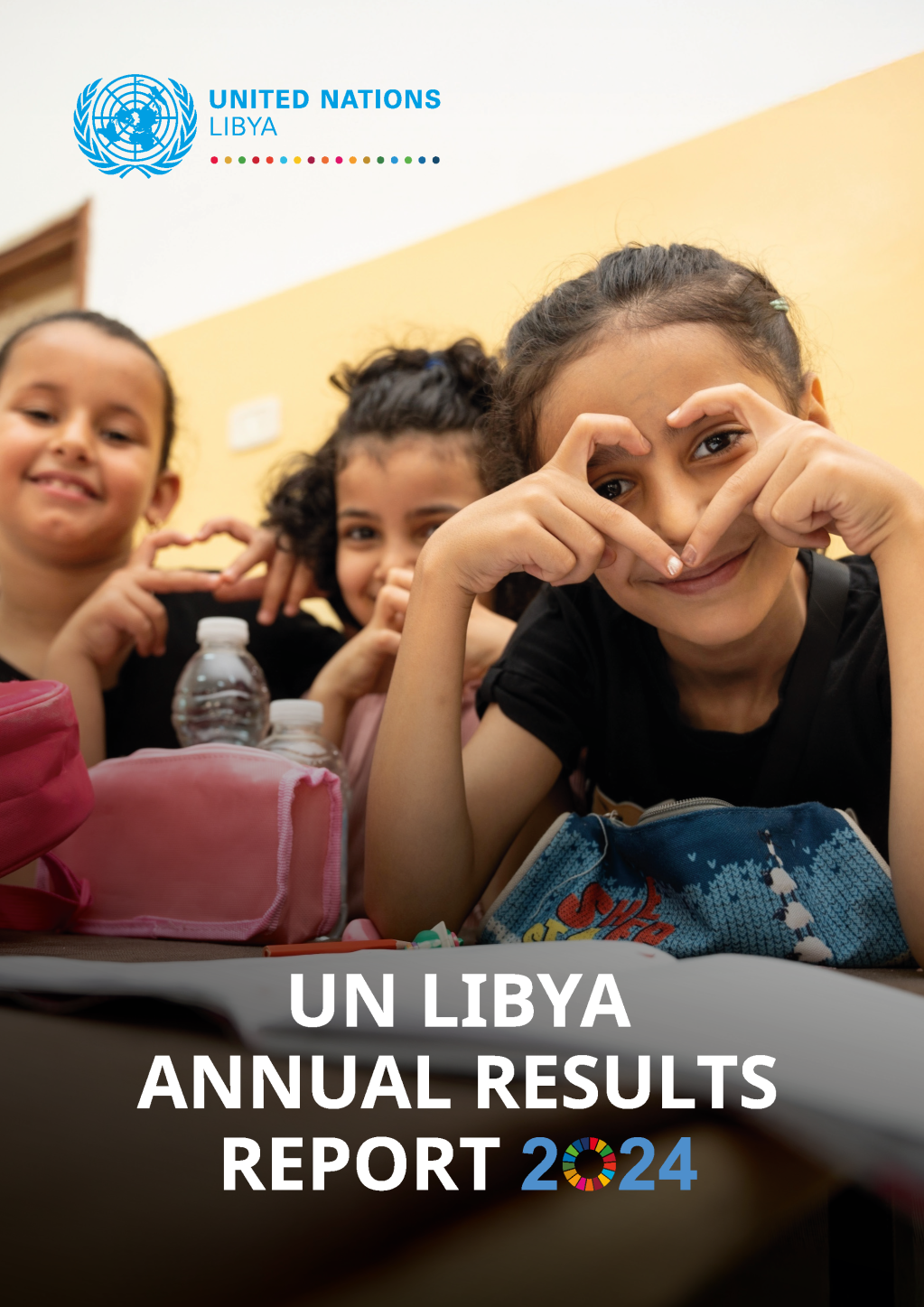
Story
19 August 2025
Her Voice, Their Hope: Celebrating Women Humanitarians on World Humanitarian Day
Hayat, 23, volunteers with the Libyan Red Crescent in Bani Waleed. When she first joined, her choice was not always welcomed. Some in her community told her, “You’re a girl, stay home.” But Hayat kept showing up. With her family’s support—especially her father’s—she stayed committed, knowing she had something meaningful to give.For Hayat, volunteering was never just a hobby. It was a responsibility. “Giving isn’t extra,” she said. “It’s something we owe each other.”As she began her work, she noticed how often women were excluded or left without support. Families didn’t always know where to turn. Hayat decided to step in, to be what she calls a “bridge” between those in need and those who could help.One of her first roles was at a local pharmacy. Many women felt uncomfortable speaking to male pharmacists about private health issues. Hayat stood beside them, helping them explain their needs. “Just standing with them gave them confidence,” she recalled. Her presence was often enough to make women feel supported.On another occasion, she visited children in the kidney ward, bringing handmade cards to lift their spirits. A young girl looked at her and said, “We want to be like you.” That moment stayed with Hayat—it reminded her why her work mattered.The path was not always easy. Some doubted her, but she chose to focus on the people she could help. “I didn’t do this for approval,” she explained. “I did it because someone needed me.”Over time, her persistence paid off. Hayat became a team leader, training new volunteers and encouraging them to grow. For her, leadership was about listening, guiding, and making space for others’ ideas.In December 2024, she took part in a Training of Trainers (ToT) program led by UN Women, the Ministry of Local Governance, and the Libyan Red Crescent. The training on women’s needs in humanitarian crises gave her practical tools she now applies in every visit and every conversation.On this #WorldHumanitarianDay, Hayat stands as an example of the countless young women who embody the true spirit of humanitarian action. She speaks with calm, steady purpose, listens without judgment, and helps women feel seen and heard—never seeking recognition for herself, but always working for others.Looking back, she says her work gave her more than she expected. “Humanitarian work shaped me,” she reflected. “It gave me a voice and a place in my country.”Her story reminds us of the power of women’s leadership in humanitarian response. This World Humanitarian Day, we celebrate Hayat—and all those who, step by step, are changing their communities and building hope.
1 of 5

Press Release
25 November 2024
United Nations in Libya calls for action to protect and promote the rights of women
The 16 Days of Activism against Violence against women and girls is an annual international campaign, which commences on 25 November, the International Day for the Elimination of Violence against Women, and ends on 10 December. Under the leadership of the United Nations Secretary-General, António Guterres, UNiTE by 2030 to End Violence against Women initiative (UNiTE) calls for global action to increase awareness, galvanize advocacy efforts and share knowledge and innovations to end VAWG once and for all.The United Nations in Libya reaffirms unwavering support to Libyans in ending all forms of violence, including against women and girls. We call on national and local authorities to urgently address any form of violence against women and girls and to advance the protection of women’s rights and their empowerment in line with their international obligations.Reports of troubling increase in online violence, including harassment, threats and sexual blackmail, particularly against activists and public figures, further underscore the need for stronger protection of women's rights including in the digital space. The United Nations in Libya remains committed to a comprehensive approach, including prevention, protection, survivor support and accountability, to ending violence against women and girls in Libya. In this context, we acknowledge the critical role of women’s empowerment in preventing violence against women. As we commence the 16 Days of Activism, the United Nations in Libya would like to recognize the progress achieved through collaboration between the state and United Nations entities in protecting and empowering women and girls. We will continue working with the government, local partners and civil society to ensure that every woman and girl in Libya can enjoy her full rights and live free from fear of violence.
1 of 5
Publication
12 August 2024
Building Peace based on Ownership of Women and Youth: Understanding and Documenting Local Experiences in Libya
The prolonged conflict in Libya has significantly hindered the progress of women and youth in peacebuilding efforts, leaving the Women, Peace, and Security (WPS) and Youth, Peace, and Security (YPS) agendas marginalized and facing considerable challenges. Despite constitutional provisions and quotas aimed at increasing women's representation in parliament and leadership positions, there are no guarantees to protect them from retaliatory actions due to the lack of security sector reforms. Moreover, the role of youth in peacebuilding is underappreciated, with many studies highlighting a significant lack of gender- and age-disaggregated data on the conflict and violence in Libya, which presents an incomplete picture of the challenges faced by Libyan women and youth. In response, UN Women Libya, in collaboration with the Global Partnership for the Prevention of Armed Conflict (GPPAC), conducted a survey to better understand and document the experiences of local peacebuilders. This paper captures the perspectives and challenges of Libyan women and youth in peacebuilding, offering insights and recommendations to enhance their inclusion and leadership in the process.
1 of 5
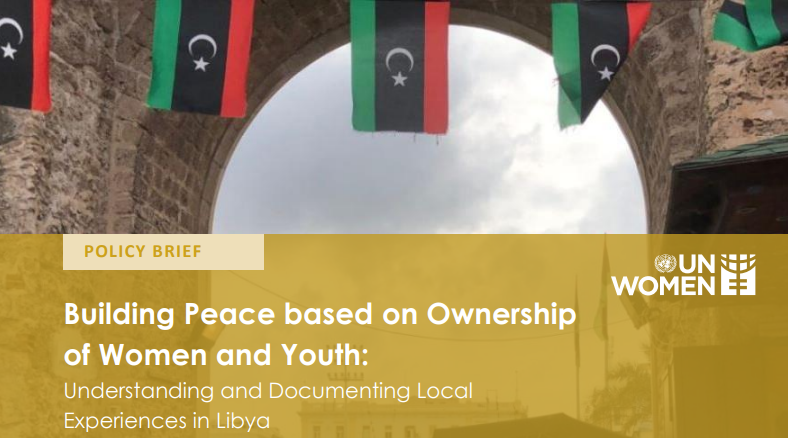
Story
24 December 2025
When the Possibility of Return Becomes Real
At the airport's departure hall, emotions were mixed with quiet anticipation. For two Syrian families who have spent years in Libya, this day marked the end of a long chapter of displacement — and the beginning of a return they once thought might never come.“We Left Under the Bombs”For Seham, 35, the memories of leaving Syria in 2012 are still vivid.
“We fled under shelling, destruction, kidnapping, and fear,” she recalled. “We escaped just to survive.”Seham arrived in Libya with her husband, Mohamed Ziyad, and their young family. Over the years, the family grew to seven — five children, three of whom were born in Libya. Life was never easy. Without residency permits, enrolling the children in school became increasingly difficult.Where Memory and Family MeetFor Mohamed Ziyad, the thought of Damascus brings back vivid memories.
“The first place any Damascene thinks of is the Umayyad Mosque,” he said. “Then the old markets, the narrow streets of the Old City — these places are part of who we are.”Over the years, he showed his children photos of Damascus on his phone, describing its streets and stories so they would know the city long before ever seeing it.Seham’s return is also a long-awaited reunion. One of her sisters remains in Syria — a separation stretched over years by war, borders, and uncertainty.
“I haven’t seen her in so long,” Seham said. “Just the thought of being able to sit together again feels unreal.” A Journey That Began at 17 Standing nearby was Nour Eddine, 29, Ziyad’s cousin, who arrived in Libya when he was just 17.
“I didn’t leave by choice,” he said. “My family forced me to leave because it was too dangerous to stay”Nour came alone at first, later marrying and raising three children in Libya.Displacement took a heavy personal toll. Nour lost both his parents while away from Syria, never having the chance to say goodbye. They suffered complications after being exposed to chemical attacks in Eastern Ghouta in Syria.“My dream was just to see my mother,” he said. “She came to Libya only to arrange my marriage — and passed away three months later.Returning to Syria was impossible financially.
“For a family of five, the cost was a dream beyond reach,” he said. “This opportunity changed everything.”When asked what he looks forward to most, Nour didn’t hesitate:
“I want to visit my father’s grave. Then I want to walk through Damascus — the Old City and the streets of my childhood.”Hope, Carried Forward As their children waited nearby — some excited, some shy, some born far from the land their parents still call home — both families spoke of hope more than fear.“Fifteen years are a lifetime,” Mohamed Ziyad said. “But returning is something we have been waiting for every single day.”In 2025, UNHCR has organized four voluntary return flights to Syria, enabling more than 400 people to return home with dignity and support. UNHCR will organize similar flights in 2026, fulfilling the dream of many Syrians of going back to a place that never left them, a place called HOME.
“We fled under shelling, destruction, kidnapping, and fear,” she recalled. “We escaped just to survive.”Seham arrived in Libya with her husband, Mohamed Ziyad, and their young family. Over the years, the family grew to seven — five children, three of whom were born in Libya. Life was never easy. Without residency permits, enrolling the children in school became increasingly difficult.Where Memory and Family MeetFor Mohamed Ziyad, the thought of Damascus brings back vivid memories.
“The first place any Damascene thinks of is the Umayyad Mosque,” he said. “Then the old markets, the narrow streets of the Old City — these places are part of who we are.”Over the years, he showed his children photos of Damascus on his phone, describing its streets and stories so they would know the city long before ever seeing it.Seham’s return is also a long-awaited reunion. One of her sisters remains in Syria — a separation stretched over years by war, borders, and uncertainty.
“I haven’t seen her in so long,” Seham said. “Just the thought of being able to sit together again feels unreal.” A Journey That Began at 17 Standing nearby was Nour Eddine, 29, Ziyad’s cousin, who arrived in Libya when he was just 17.
“I didn’t leave by choice,” he said. “My family forced me to leave because it was too dangerous to stay”Nour came alone at first, later marrying and raising three children in Libya.Displacement took a heavy personal toll. Nour lost both his parents while away from Syria, never having the chance to say goodbye. They suffered complications after being exposed to chemical attacks in Eastern Ghouta in Syria.“My dream was just to see my mother,” he said. “She came to Libya only to arrange my marriage — and passed away three months later.Returning to Syria was impossible financially.
“For a family of five, the cost was a dream beyond reach,” he said. “This opportunity changed everything.”When asked what he looks forward to most, Nour didn’t hesitate:
“I want to visit my father’s grave. Then I want to walk through Damascus — the Old City and the streets of my childhood.”Hope, Carried Forward As their children waited nearby — some excited, some shy, some born far from the land their parents still call home — both families spoke of hope more than fear.“Fifteen years are a lifetime,” Mohamed Ziyad said. “But returning is something we have been waiting for every single day.”In 2025, UNHCR has organized four voluntary return flights to Syria, enabling more than 400 people to return home with dignity and support. UNHCR will organize similar flights in 2026, fulfilling the dream of many Syrians of going back to a place that never left them, a place called HOME.
1 of 5

Story
16 December 2025
75 years of providing Protection
Every day in Libya, families who fled war and persecution face uncertainty, yet also show extraordinary courage, resilience, and hope.
As we approach the end of the year, and as UNHCR marks 75 years of protecting people forced to flee, we reflect on moments of dignity, protection, and human connection made possible through the support of donors and partners who stand with people seeking safety.Across Libya, UNHCR meets mothers, fathers, and children carrying stories of loss and survival, but also of reunification, recovery, and new beginnings.Here are seven real moments from this year that remind us why solidarity matters, and why protection remains as essential today at it was 75 years ago1. A Family Reunited at the Registration Centre
June 2025 – Tripoli, Libya. Zubaida and Ahmed pose with their two children at a UNHCR registration centre.When Zubaida fled Zamzam camp under shelling, she lost her brothers, was shot three times, and became separated from her husband, Ahmed.
She arrived in Tripoli with her two children, carrying more fear than belongings. UNHCR began family tracing, and through the process, staff discovered that Ahmed had recently registered separately in Libya. They were able to bring the family together again“I am so happy beyond words that we are reunited,” Zubaida exclaimed. “I didn’t think I would ever see him again.”“This is the best surprise of my life,” Ahmed added emotionally.A moment of protection — and pure relief.2. 13 Years on the Move, Finally Safe June 2025 – Gashora camp, Rawanda. Rahma stands with her children at the Emergency Transit Mechanism (ETM) facility.For 13 years, Rahma fled conflict across Sudan, Egypt, and Libya — losing her brother and husband along the way.
Her family endured detention, exploitation, and constant fear until they were evacuated to Rwanda under the Emergency Transit Mechanism.In Rwanda, for the first time, she could breathe.“Today I feel safe — a feeling I haven’t had in 13 years. My children can learn and play again.”Safety is more than a place; it is the ability to dream again.3. Eight Days Across the Desert to Save Her Children May 2025. Alkufra Libya. Samia and her children receiving wheelchairs and core relief items from UNHCR staff. Samia fled Kutum with six children — three living with disabilities — after armed groups raided their home and shelling intensified. She carried them on foot through the desert for eight days.Since arriving in Alkufra, UNHCR provided blankets and hygiene items — as well as a wheelchair for each of her children, bringing comfort, and mobility to her family.“Nothing replaces the safety of home,” she said, “but these items helped us survive.”A reminder that even small items, and the gift of mobility can ease the burden of displacement.4. Helping Children Heal from Trauma October 2025. Tripoli Libya. Hamza participates in drawings as part of healing therapy at the UNHCR Child Friendly Space.Nine-year-old Hamza arrived in Libya deeply affected by the violence he witnessed in Darfur.
Loud sounds terrified him. He would grab his chest and cry, convinced his heart would stop.Through UNHCR’s psychosocial support, Hamza now takes part in activities designed to help children process fear, rebuild confidence, and feel safe again.
His mother says the change is visible — the nightmares are fewer, and he smiles more often.Hamza is still healing, but with the right support, he is finding his way back to childhood.5. Humanitarian Evacuation to Italy — A New Beginning for Khadra February 2025. Tripoli Libya. Khadra and her children, boarding a bus to Mitiga airport to be evacuated to Italy through the Humanitarian Corridor. Khadra survived forced marriage, trafficking, torture, and years of violence.
This year, she boarded a humanitarian evacuation flight to Italy with her three children.“Today, I have hope again,” she said. “I want my children to grow up with dignity.”Every safe pathway is a life transformed.6. Essential Care for Children Forced to Flee September 2025. Benghazi, Libya. Ritaj is receiving routine vaccination against Polio in a public health clinic.In Benghazi, Mahasen, a Sudanese mother of seven who arrived in February 2025 after a dangerous journey fleeing the war, brings her youngest daughter Ritaj (7) to the Ras Obeida polyclinic.The centre — rehabilitated by UNHCR — provides essential services to displaced families, including vaccinations for preventable diseases.Ritaj was vaccinated against polio, a moment of reassurance for a mother who has crossed borders to protect her children.This clinic is a lifeline for my children and I," Mahasen said. “I am very happy that Ritaj was vaccinated — this means safety for my little one.”In a life full of uncertainty, access to healthcare gives families like hers the chance to stay healthy and hopeful.As this year ends, and as UNHCR marks 75 years of standing alongside people forced to flee, we honour the resilience of families seeking safety, and all those who walk beside them.What people wish for most is simple:
peace, safety, and the chance to return home when it becomes possible.Until that day, your support keeps hope alive. AcknowledgmentWe extend our thanks to all our donors, international and national partners, and our UN sister agencies within the regional response plan and the Resident Coordinator’s Office. Your support makes our work possible.About UNHCRUNHCR has been operating in Libya since 1991 and has offices in Tripoli and Benghazi, and outposts in Alkufra, Ajdabiya and Sabha, as well as a back-office in Tunis. In Libya UNHCR maintains access to refugees and upholds their fundamental rights. It provides life-saving assistance to refugees and asylum seekers in detention centres, disembarkation points and in urban settings, and finds durable solutions outside Libya for the most vulnerable and at-risk refugees and asylum seekers. UNHCR collaborates very closely with the Government and authorities. Because refugees are spread throughout the country, UNHCR provides support to host communities to be able to cope with the additional needs in their towns and villages.
As we approach the end of the year, and as UNHCR marks 75 years of protecting people forced to flee, we reflect on moments of dignity, protection, and human connection made possible through the support of donors and partners who stand with people seeking safety.Across Libya, UNHCR meets mothers, fathers, and children carrying stories of loss and survival, but also of reunification, recovery, and new beginnings.Here are seven real moments from this year that remind us why solidarity matters, and why protection remains as essential today at it was 75 years ago1. A Family Reunited at the Registration Centre
June 2025 – Tripoli, Libya. Zubaida and Ahmed pose with their two children at a UNHCR registration centre.When Zubaida fled Zamzam camp under shelling, she lost her brothers, was shot three times, and became separated from her husband, Ahmed.
She arrived in Tripoli with her two children, carrying more fear than belongings. UNHCR began family tracing, and through the process, staff discovered that Ahmed had recently registered separately in Libya. They were able to bring the family together again“I am so happy beyond words that we are reunited,” Zubaida exclaimed. “I didn’t think I would ever see him again.”“This is the best surprise of my life,” Ahmed added emotionally.A moment of protection — and pure relief.2. 13 Years on the Move, Finally Safe June 2025 – Gashora camp, Rawanda. Rahma stands with her children at the Emergency Transit Mechanism (ETM) facility.For 13 years, Rahma fled conflict across Sudan, Egypt, and Libya — losing her brother and husband along the way.
Her family endured detention, exploitation, and constant fear until they were evacuated to Rwanda under the Emergency Transit Mechanism.In Rwanda, for the first time, she could breathe.“Today I feel safe — a feeling I haven’t had in 13 years. My children can learn and play again.”Safety is more than a place; it is the ability to dream again.3. Eight Days Across the Desert to Save Her Children May 2025. Alkufra Libya. Samia and her children receiving wheelchairs and core relief items from UNHCR staff. Samia fled Kutum with six children — three living with disabilities — after armed groups raided their home and shelling intensified. She carried them on foot through the desert for eight days.Since arriving in Alkufra, UNHCR provided blankets and hygiene items — as well as a wheelchair for each of her children, bringing comfort, and mobility to her family.“Nothing replaces the safety of home,” she said, “but these items helped us survive.”A reminder that even small items, and the gift of mobility can ease the burden of displacement.4. Helping Children Heal from Trauma October 2025. Tripoli Libya. Hamza participates in drawings as part of healing therapy at the UNHCR Child Friendly Space.Nine-year-old Hamza arrived in Libya deeply affected by the violence he witnessed in Darfur.
Loud sounds terrified him. He would grab his chest and cry, convinced his heart would stop.Through UNHCR’s psychosocial support, Hamza now takes part in activities designed to help children process fear, rebuild confidence, and feel safe again.
His mother says the change is visible — the nightmares are fewer, and he smiles more often.Hamza is still healing, but with the right support, he is finding his way back to childhood.5. Humanitarian Evacuation to Italy — A New Beginning for Khadra February 2025. Tripoli Libya. Khadra and her children, boarding a bus to Mitiga airport to be evacuated to Italy through the Humanitarian Corridor. Khadra survived forced marriage, trafficking, torture, and years of violence.
This year, she boarded a humanitarian evacuation flight to Italy with her three children.“Today, I have hope again,” she said. “I want my children to grow up with dignity.”Every safe pathway is a life transformed.6. Essential Care for Children Forced to Flee September 2025. Benghazi, Libya. Ritaj is receiving routine vaccination against Polio in a public health clinic.In Benghazi, Mahasen, a Sudanese mother of seven who arrived in February 2025 after a dangerous journey fleeing the war, brings her youngest daughter Ritaj (7) to the Ras Obeida polyclinic.The centre — rehabilitated by UNHCR — provides essential services to displaced families, including vaccinations for preventable diseases.Ritaj was vaccinated against polio, a moment of reassurance for a mother who has crossed borders to protect her children.This clinic is a lifeline for my children and I," Mahasen said. “I am very happy that Ritaj was vaccinated — this means safety for my little one.”In a life full of uncertainty, access to healthcare gives families like hers the chance to stay healthy and hopeful.As this year ends, and as UNHCR marks 75 years of standing alongside people forced to flee, we honour the resilience of families seeking safety, and all those who walk beside them.What people wish for most is simple:
peace, safety, and the chance to return home when it becomes possible.Until that day, your support keeps hope alive. AcknowledgmentWe extend our thanks to all our donors, international and national partners, and our UN sister agencies within the regional response plan and the Resident Coordinator’s Office. Your support makes our work possible.About UNHCRUNHCR has been operating in Libya since 1991 and has offices in Tripoli and Benghazi, and outposts in Alkufra, Ajdabiya and Sabha, as well as a back-office in Tunis. In Libya UNHCR maintains access to refugees and upholds their fundamental rights. It provides life-saving assistance to refugees and asylum seekers in detention centres, disembarkation points and in urban settings, and finds durable solutions outside Libya for the most vulnerable and at-risk refugees and asylum seekers. UNHCR collaborates very closely with the Government and authorities. Because refugees are spread throughout the country, UNHCR provides support to host communities to be able to cope with the additional needs in their towns and villages.
1 of 5

Story
23 November 2025
It’s Time to Go Home - From One Home to Another
Tripoli, Libya – On 13 November, 144 women, men, and children boarded the first two voluntary repatriation flights from Libya to Syria, a moment, for many families, marking the end of 14 years of fleeing war. Among them was Samer (38), and his family – his wife Ghazal and their son and daughter.For Samer, the journey home is the closing of a chapter marked by war, loss, and survival, and the beginning of rebuilding a life he has long dreamed of returning to.Samer grew up in Homs, in the Al-Bayada neighbourhood — a place he remembers for its warmth, its open doors, and its kind people. When war reached their streets, life became impossible. The area was completely besieged.“Food couldn’t enter; supplies couldn’t enter — life was impossible,” he recalls. “I had to leave to work and send money to my parents for medicine and food. Otherwise, it was detention or death.” Fleeing for his life, he arrived in Libya – a country he says he loved from the beginning.“The reception we saw at the Libyan border… indescribable. People were generous with children. I will never forget that.”Samer arrived in Libya in December 2011 got married and settled in Derna. His two children were born there. But when the security situation became untenable in Derna in 2015, the young family fled, travelling for several days until they reached Tripoli. Samer worked hard to rebuild life for his family — first in a restaurant, then at a grocery store. But instability continued, and he was forced to move again.Over the years, Samer lived in Misrata, Tripoli and Zintan, always searching for a safer, more stable environment where his children could grow, play, and have a sense of normality.“I registered every year. I never missed a renewal.” After conditions changed in his hometown in Syria, Samer asked UNHCR Libya about voluntary repatriation.“When they called me and said my name had come up for voluntary return… the joy cannot be described. It’s a feeling I cannot give to anyone — the right to go back to my homeland.”He remembers arriving two hours early for his medical check “from excitement alone.”When the final call came — the confirmation he had been waiting for — he immediately shared the news with friends in Misrata, Syrians and Libyans alike.“Our family in Syria did not sleep that night. Tears of joy.”He speaks with warmth about the people he met along the way — neighbours who supported him, friends who welcomed his children, and communities that helped him feel at home, and he will sadly leave them now.“I built a home in almost every place in Libya,” he says. “I met good people who stood by me.” For Samer, these memories are now part of the journey he carries back with him as he returns to Syria.Today, as Samer prepares to step onto the aircraft, among the 53 women, men and children returning after a long time of being away from home, he holds the hands of the two children who were babies when their journey began — and who are now old enough to carry their own memories.Ahead of him lies the rubble of the neighbourhood he once knew — but also his parents, still alive, waiting for him. And the hope, as he says, “that Syria will rebuild quickly”The voluntary repatriation flight marks not an end, but a new beginning — for Samer, for his children, and for the 144 Syrians taking their first steps back to a homeland many have not seen in more than a decade.“It’s time to go home,” Samer says softly. “By God’s grace — and thanks to UNHCR, from my heart.”
1 of 5

Story
30 October 2025
When Home Is Not a Place, But a Mother
Despite displacement and hardship, she strives to give her children warmth and a sense of belonging. @UNHCR\Malaz When the war reached her neighbourhood in Niyala, south of Darfur, Massara’s life changed in a single night. Their home stood close to a military warehouse — a constant target. “There was fire everywhere,” she recalls. “The militia attacked us. My son Hafez was shot in the leg. Then both of my sons — Hafez and Mohamed — disappeared. They went missing, and until today I don’t know if they are alive.”Not long after, her husband was abducted. “Men were being targeted. There was no safety anywhere,” she says. With her daughters and youngest son terrified, and the family home destroyed, she made the only decision a mother could make — to flee to protect the children she still had with her.She arrived in Libya in October 2023, carrying nothing bu t fear and a determination to keep her daughters safe. “My biggest worry was losing them too,” she says. “Especially my daughters.”The emotional toll of the war followed the children even after reaching safety. “They lost their father for a long time, and their brothers. They have nightmares. Loud sounds terrify them.” Nine-year-old Hamza cries when he hears fireworks. “He holds his chest and says, ‘Mum, I will die now, my heart will stop.’ I hold him and tell him, ‘I am here, no one will touch you.’”Tripoli Libya (2025) Massara holds her son Hamza, after fleeing the conflict in Darfur. For Hamza, safety means being in his mother’s arms. @UNHCR\MalazTo survive, she began searching for work every day — markets, shops, houses — but it meant leaving the children alone. “It broke me, but what choice did I have?” Months later, two of her oldest daughters began cleaning houses so she could remain with the youngest ones during the day. “They became caretakers too — children taking care of each other.”After two years apart, her husband was able to rejoin the family, but his health is fragile after being tortured whilst detained in Sudan, and he cannot work. The burden remains on her shoulders. “As a mother, even when I am exhausted or sick, I don’t show it,” she says. “I cry in a dark room when they sleep, but I wake up strong again because they only have me.”The hardest part for her is not fear — it is watching childhood slip away. “There is no education, no chance for them to learn. I promised them I would put them in school, but I know I cannot. My heart is broken because I know I will break this promise.”Yet, she holds on to hope. “What gives me strength is my dream that one day they will be safe, have an education, and grow up in a peaceful place. I want to watch them be who they are meant to be.”When asked what care means after everything she has survived, her answer is simple and profound:
“Care is being your family’s protector — their life saver, their backbone.”For the International Day of Care and Support, her message is for every mother who carries her family alone in silence:
“Our children need us. We are their strength and hope. Even when we feel weak, we must stay strong — because they draw their courage and strength from us.” UNHCR in Libya has been operating in Libya since 1991 and has offices in Tripoli and Benghazi, and outposts in Alkufra and Ajdabiya, as well as a back-office in Tunis. In Libya UNHCR maintains access to refugees and upholds their fundamental rights. It provides life-saving assistance to refugees and asylum seekers in detention centres, disembarkation points and in urban settings, and finds durable solutions outside Libya for the most vulnerable and at-risk refugees and asylum seekers. UNHCR collaborates very closely with the Government and authorities. Because refugees are spread throughout the country, UNHCR provides support to host communities to be able to cope with the additional needs in their towns and villages.
“Care is being your family’s protector — their life saver, their backbone.”For the International Day of Care and Support, her message is for every mother who carries her family alone in silence:
“Our children need us. We are their strength and hope. Even when we feel weak, we must stay strong — because they draw their courage and strength from us.” UNHCR in Libya has been operating in Libya since 1991 and has offices in Tripoli and Benghazi, and outposts in Alkufra and Ajdabiya, as well as a back-office in Tunis. In Libya UNHCR maintains access to refugees and upholds their fundamental rights. It provides life-saving assistance to refugees and asylum seekers in detention centres, disembarkation points and in urban settings, and finds durable solutions outside Libya for the most vulnerable and at-risk refugees and asylum seekers. UNHCR collaborates very closely with the Government and authorities. Because refugees are spread throughout the country, UNHCR provides support to host communities to be able to cope with the additional needs in their towns and villages.
1 of 5

Story
18 October 2025
UN in Libya marks 80 years of the UN with a public photography exhibition in downtown Tripoli
Representatives of the United Nations in Libya, joined by Libyan ministers and officials, ambassadors, members of the public, and Special Representative of the Secretary General, Hanna Tetteh, celebrated the UN Day and opened a photography exhibition, entitled “Building Our Future Together”, at Eskandar Arts House.The exhibition marks eighty years since the founding of the organization and highlights the UN’s partnership with the people of Libya in advancing peace, stability and sustainable development. “This exhibition tells the stories of partnership and perseverance: teachers keeping classrooms open during power cuts, engineers restoring water systems, youth cleaning beaches, women entrepreneurs creating livelihoods, and advocates ensuring accessibility for all,” said SRSG Tetteh. She added that the exhibition invites all Libyans, international partners and UN colleagues to work side by side for a common purpose supporting the country’s progress. The UN Day commemorates the entry into force of the UN Charter in 1945, marking the formal establishment of the UN. For eighty years, the UN has sought to advance the principles of peace, justice, human rights, and international cooperation. Libya was one of the first nations to be affirmed for independence through the UN system, following resolutions of the General Assembly in 1949. “Through many initiatives across Libya, including those represented in this photo exhibition, the UN stands with Libyans: connecting, supporting and helping your ideas, knowledge and skills grow. Our measure of success will not be how many barriers we remove together, but how many opportunities we create together,” said SRSG Tetteh in her opening remarks. The opening ceremony was followed by a round table discussion with youth, women and persons with disabilities from across the country, led by DSRSG Stephanie Koury and DSRSG Ulrika Richardson, alongside representatives from UNDP, UNFPA and UNHCR. The discussion focused on amplifying the perspectives of Libya’s next generation and highlighting their aspirations for a better future. In her opening remarks, DSRSG/RC Richardson highlighted “Libya stands at a turning point, and Libya’s younger generation has shown that it has the courage, talent and vision to steer the country toward stability and peace”. She added it was “important to build together a Libya where every voice counts and every person contributes to lasting peace and development.” “The future of any country is constantly being built through dialogue between generations, blending wisdom with new ideas,” added SRSG Tetteh. “To Libya’s young people, ultimately you will lead the way with your dreams, skills, expertise and courage. Your participation is not symbolic, it is essential.” The UN entities working to support a better future in Libya are: FAO, ILO, IOM, OCHA, OHCHR, UN Habitat, UN Women, UNDP, UNESCO, UNFPA, UNHCR, UNICEF, UNIDO, UNMAS, UNODC, UNOPS, UNSMIL, WFP and WHO.
1 of 5
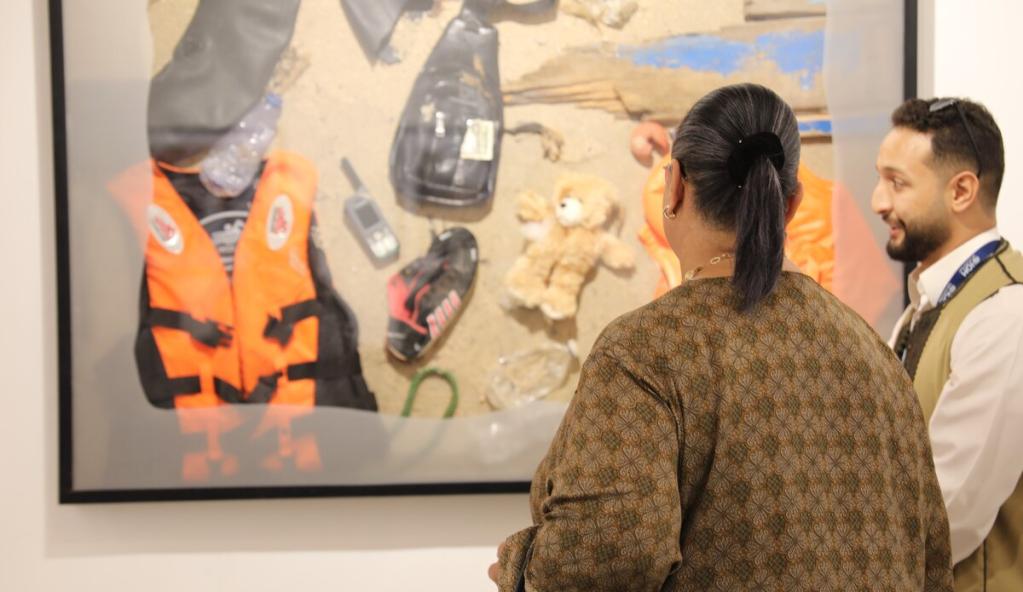
Press Release
10 December 2025
Libya Marks International Anti-Corruption Day with the Launch of Phase II of the EU-Funded Project to Counter Corruption and Money Laundering, Implemented by UNODC
Libya commemorated International Anti-Corruption Day by launching Phase II of the European Union–funded project, “Building Libya’s National Capacity to Prevent and Combat Corruption and Money Laundering.” Implemented by UNODC Regional Office for the Middle East and North Africa (ROMENA) through its Programme Office in Libya, in partnership with the Supreme Committee Supervising the National Strategy for Performance, Oversight, Anti-Corruption, and Prevention (2025–2030) in the Administrative Control Authority (ACA). The project aims to strengthen further Libya’s institutional ability to prevent, detect, investigate, and respond to corruption and financial crimes.The signing was conducted by the Chair of the Supreme Committee Supervising the National Strategy for Performance, Oversight, Anti-Corruption, and Prevention (2025–2030), Mr. Ibrahim Abdulkarim Ali, and the Head of UNODC Programme Office in Libya, Dr. Tariq Sonnan. In this respect, the launch took place during the celebration of the State of Libya for the International Anti-Corruption Day, which was attended by more than 500 representatives from national authorities, as well as regional and international government officials. The celebration also marks the convening of a two-day Expert Group Meeting in Tripoli, gathering representatives from anti-corruption bodies from Libya, Algeria, Jordan, and Morocco, in addition to international experts from the Organization for Economic Cooperation and Development (OECD). Participants will be able to discuss the effective implementation of national anti-corruption strategies, with a particular focus on Libya’s National Strategy for Performance, Oversight, Anti-Corruption, and Prevention (2025–2030). The meeting will highlight the best regional and international practices for implementing national anti-corruption strategies, including effective inter-agency coordination and guidance on developing, monitoring, evaluating, and reporting on national strategies.In this respect, Mr. Abdulhamid Al-Dabaiba, Prime Minister, Government of National Unity, stated: “The inter-agency cooperation among executive bodies and supervisory authorities in Libya was commemorated with the development and launching of the national anti-corruption strategy of Libya. These efforts embody the strong political will and belief in the crucial role of supervisory authorities to combat corruption, and strengthen transparency and integrity.”Dr. Mohamed Takala, President of the High Council of State, highlighted that “developing a modern public administration should be supported by digital transformation, and transparent government-citizens transactions to prevent corruption. In this sense, the High Council of State is committed to supporting the process of institutional reform, and to providing a legislative environment that supports the independence of supervisory authorities to guarantee the effectiveness of their mandate to combat corruption, which contributes towards building a strong nation”.Mr. Abdulla Gadirboh, Chairman of the Administrative Control Authority, highlighted that “Libya was among the first States to sign and ratify the United Nations Convention against Corruption. We have worked tirelessly to implement its provisions on institutional and legislative levels by developing anti-corruption and transparency laws as well as establishing the Administrative Control Authority with the mandate to combat all forms of corruption and to mainstream integrity principles, including the preservation and maintenance of public funds and ensuring the transparent access to information.”Mr. Nicola Orlando, Ambassador of the European Union Delegation to Libya, stated: “The European Union stands firmly with leading institutions and civil society in combating corruption, which is a generational challenge. Moreover, to strengthen transparency, accountability, and the rule of law across the country. National anti-corruption strategies are vital in these matters as they bring together all efforts in a comprehensive and organized way to ensure that related initiatives converge towards national interests. The EU is honored to witness the launching of this EU-supported flagship project to strengthen national capacities to combat corruption and money laundering in Libya.”Ms. Ulrika Ingeborg, Deputy Special Representative of the Secretary-General / Resident Coordinator (DSRSG/RC) stated “The United Nations remains fully committed to supporting Libya in building strong economic governance systems, enhancing oversight mechanisms and reinforcing the national capacity to prevent and combat corruption. These reforms are essential for restoring public trust and advancing stability and prosperity that all Libyans deserve.”Ms. Cristina Albertin, UNODC Regional Representative for the Middle East and North Africa, reiterated, “Corruption is a global challenge, yet the most effective solutions are built at the national level through strong leadership and meaningful collaboration. Our long-standing partnership with Libya has benefited over 600 officials and representatives, including prosecutors, investigators, law enforcement officials, financial analysts, academics, and youth, strengthening their skills in countering corruption, financial crimes, and promoting integrity.”Phase II builds on these achievements and aims to strengthen further the capacity of national institutions to detect, investigate, and adjudicate corruption and money laundering cases. It will also advance preventive measures against financial crimes while expanding efforts to engage Libyan youth in identifying and reporting corrupt practices and promoting ethical conduct in both business and community settings.Over the coming three years, the project will work to enhance transparency and integrity in public administration, strengthen operational and legal capacities to counter corruption and money laundering, and deepen national, regional, and international cooperation to address cross-border financial crimes.
1 of 5
Press Release
20 June 2025
World Refugee Day 2025
Tripoli, 20 June 2025 – On World Refugee Day, UNHCR, the UN Refugee Agency, joins the international community in honouring the courage and strength of people forced to flee persecution, conflict, and violence. This year’s theme, “Solidarity with Refugees”, is a call to action – to stand together, listen to refugees’ stories, and support their right to seek safety.In Libya, thousands of people who fled war and insecurity, including recent arrivals from Sudan, continue to face enormous challenges. Many families have lost everything and are still unable to return home. Most refugees are living in difficult conditions, often in underserved areas where local Libyan communities are also struggling with overstretched services.UNHCR is working closely with Libyan authorities and partners across the country to support both refugees and the Libyan people hosting them. This includes distributing core relief items, improving access to water and sanitation, rehabilitating health and education facilities, and providing support through community-based centres. According to the newly released UNHCR Global Trends Report, over 120 million people worldwide are now forcibly displaced – the highest number ever recorded. Ongoing crises, conflicts, and the absence of political solutions continue to push people into forced displacement. In this context, the need for global solidarity and responsibility-sharing has never been greater.“Solidarity with refugees means standing with people in their hardest moments – not with words, but with actions,” said Karmen Sakhr, UNHCR’s Chief of Mission in Libya. “It means supporting both those forced to flee and the communities who host them. In Libya, we see remarkable examples of solidarity every day – the way the authorities coordinate humanitarian support, and Libyan families who share what they have.”UNHCR reiterates its commitment to supporting the authorities and people of Libya in responding to humanitarian needs, whilst at the same time advocating for political solutions to enable people to return home.Refugees are not alone. On World Refugee Day – and every day – we stand with them.For media inquiries, please contact:Aml Albarghouti Assistant Communications Officer, UNHCR Libyaalbarghouti@unhcr.org
1 of 5
Press Release
13 March 2025
Statement by the United Nations in Libya warns against misinformation and hate speech
TRIPOLI – The United Nations recognizes the commitment of the Libyan national and municipal authorities to addressing the concerns of the Libyan people. Underscoring the importance of preserving the national sovereignty of Libya, the UN support in strengthening migration governance is aligned with Libya’s national priorities.The United Nations in Libya is deeply concerned with a misinformation campaign that is fueling tensions in Libya and inciting hate speech against refugees and migrants. Misleading narratives only foster fear and hostility.The United Nations urges all actors to refrain from spreading unverified information and to ensure that public discourse is fact-based and respectful of human rights.
1 of 5
Press Release
25 December 2024
UN General Assembly adopts landmark convention on cybercrime
The United Nations General Assembly adopted today a new convention to prevent and combat cybercrime, concluding a five-year negotiation process. The UN Convention against Cybercrime aims to prevent and combat cybercrime more efficiently and effectively, including by strengthening international cooperation and by providing technical assistance and capacity-building support, particularly for developing countries. “We live in a digital world, one where information and communications technologies have enormous potential for the development of societies, but also increases the potential threat of cybercrime. With the adoption of this Convention, Member States have at hand the tools and means to strengthen international cooperation in preventing and combating cybercrime, protecting people and their rights online,” said the President of the UN General Assembly Philémon Yang. The UN Office on Drugs and Crime (UNODC) served as secretariat to the negotiations. “The adoption of this landmark convention is a major victory for multilateralism, marking the first international anti-crime treaty in 20 years. It is a crucial step forward in our efforts to address crimes like online child sexual abuse, sophisticated online scams and money laundering,” said UNODC Executive Director Ghada Waly. “In today’s digital age, cybercrime is becoming more pervasive and destructive, exploiting the vulnerable and draining trillions from our economies every year,” she added. “UNODC stands ready to support Member States in signing, ratifying and implementing this new treaty by providing countries with the tools, assistance and capacity-building support they need to protect their economies and safeguard the digital sphere from cybercrime.”The General Assembly adopted the resolution without a vote. UN Member States, with the input of civil society, academic institutions and the private sector, had negotiated the text for over five years. The Convention will open for signature at a formal ceremony to be hosted by Viet Nam in 2025. It will enter into force 90 days after being ratified by the 40th signatory. UNODC will continue to serve as secretariat to the Ad Hoc Committee, which is mandated to negotiate a draft protocol to supplement the Convention, as well as to the future Conference of the States Parties.To read the text of the Convention, click here.*****For further information please contact:Sonya YeeChief, UNODC Advocacy SectionMobile: (+43-699) 1459-4990Email: unodc-press[at]un.org*****
1 of 5
Press Release
10 October 2024
Announcing the Appointment of Mr Aeneas Chuma as Deputy Special Representative of the Secretary-General, Resident and Humanitarian Coordinator for Libya, ad interim
Before this appointment, Mr. Chuma served as the United Nations Resident Coordinator in Eritrea. Mr. Chuma held several positions within the United Nations, including serving as ILO Assistant Director-General and Regional Director for Africa from 2014 to 2017. He was appointed as the acting United Nations Resident and Humanitarian Coordinator in Ethiopia in October 2018. He also served as Assistant Secretary General and Deputy Special Representative of the Secretary-General for the United Nations Mission, the United Nations Resident and Humanitarian Coordinator, and UNDP Resident Representative in Liberia from 2012-2014. Mr. Chuma also served as the UN Resident and Humanitarian Coordinator and UNDP Resident Representative in Kenya from 2008 to 2012 and Zambia from 2003 to 2008. From 2000 to 2003, he was Mozambique's UN Deputy Resident Representative. He also held various positions with the United Nations Development Programme in New York, Oman, and Zimbabwe.Mr. Chuma holds a master’s degree in applied economics from the University of California, Santa Cruz.
1 of 5
Latest Resources
1 / 11
1 / 11


